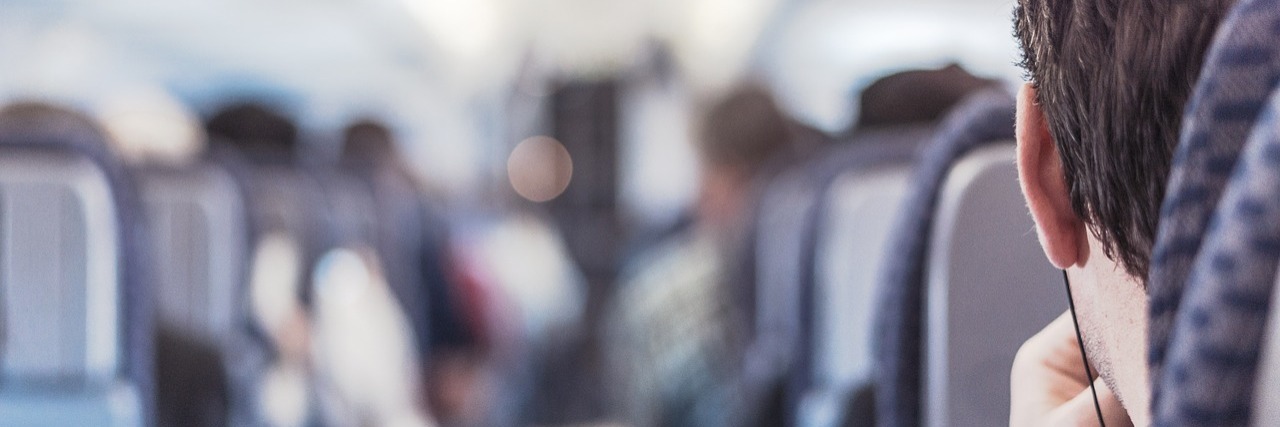“Can you believe they put someone with Down syndrome in the exit row?”
My sister grabbed my arm in shock, and I tensed up. We were on a flight to Oregon with the rest of our family to visit some relatives, sitting in an exit row all together, when we overheard this passing remark from one of the flight staff. We’d taken dozens of flights before with our brother Griffin, who has Down syndrome, and sat in an exit row many times. Why they had suddenly chosen to remark on his disability, we couldn’t say.
A moment later, a flight attendant approached our mom in the aisle seat and calmly told her the captain didn’t “feel comfortable having him [nodding toward Griffin] in the exit row.” This was all within earshot of Griffin, who sat in the next seat over.
“I’m sorry, but he is completely capable to assist in an emergency, and this is discriminatory,” my mom replied, vocalizing what we had all been thinking. By this point, Griffin was upset and expressed that he would prefer to not sit there, so he switched places with my uncle who was a few rows back. I won’t make any assumptions on his part, but I will say he had no intention of moving until the flight attendant made this comment to my mom.
Now, it’s entirely understandable that an airline would want to minimize risk by having its passengers in the exit row be intellectually and physically capable. However, in this case an assumption was made based solely upon Griffin’s physical appearance that he would be unable to carry out the necessary duties should an emergency arise. Griffin is an extremely high-functioning individual, both physically and intellectually. He works out three days a week with a personal trainer, has a part-time job, and is on track to getting his high school diploma. Should an emergency arise, there’s no doubt in my mind he would be more than capable of assisting others.
Furthermore, Griffin’s placement in the exit row was not a violation of airline policy. The FAA guidelines as stated on our airline’s website read as follows: “The government requires any passengers seated in an exit row to be 15 years of age or older, be willing to assist in an evacuation and have no limitations that would prohibit their assistance. Before allowing passengers to travel in exit row seats, [the airline] must determine if they are able to take all required actions in the event of an emergency. For this reason, we may withhold exit row seats until the day of departure.”
Griffin is 17, and thus old enough to sit in an exit row. He gave the flight attendant a verbal confirmation that he was willing and able to assist. He reviewed the exit row instructions with our parents and read the placard on the exit door. So the only remaining conclusion is that our airline believed Down syndrome is a “limitation” that would prohibit Griffin from assisting during an emergency.
In response to what happened during our flight, my sister tweeted at our airline, explaining the situation and demanding a response. Luckily, we received a reply as soon as we landed, and by the next day we had spoken with a high-level employee who promised to address our concerns within the company at large and to provide bias training to the staff of the airplane we had been on. We felt heard, and despite our initial frustration and confusion, it seemed like things were moving in the right direction.
However, not a week later, my mom was speaking with a close family friend of ours who has a daughter with Down syndrome, and was dismayed to learn that she too had been asked to leave an exit row on a separate airline that very same week. Clearly, this is a problem much larger than my family’s incident.
No airline passenger deserves to be marginalized because of how they look, and no one deserves to have their abilities questioned without any prior knowledge. If a passenger with a disability is truly unable to assist in the event of an emergency, then a decision must be reasonably made by those who know that passenger best and are aware of his or her level of functioning, not arbitrarily by a flight attendant or captain.
This is an issue not just of airplane policy, but of implicit bias, and it needs to be addressed soon. I hope for all of our sake that things change sometime in the near future, and that airline staff is retrained to address these situations differently. But for now, next time my family takes a flight, we’ll unfortunately have to think twice about buying Griffin a seat in the exit row.
Image via Pixabay.

